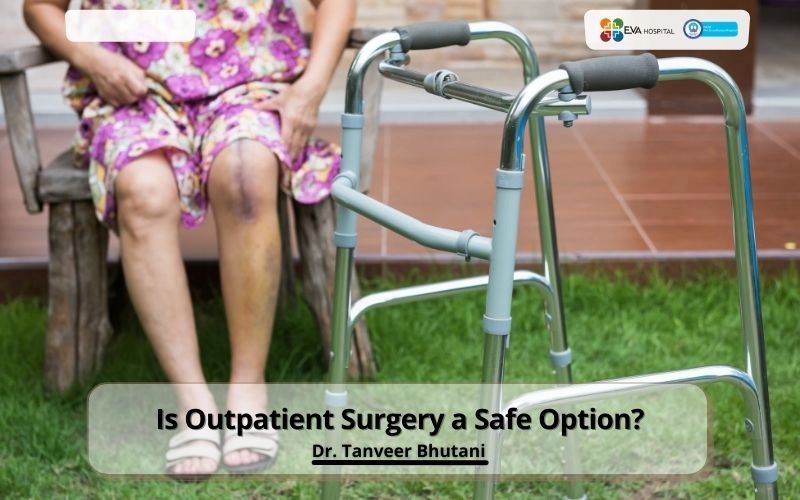Is Outpatient Surgery a Safe Option?
 Eva Hospital
Eva Hospital
Is Outpatient Surgery a Safe Option?
Joint Replacement Surgery- An Introduction
Arthritis and routine wear and tear can cause hip, knee, and other joint pains. However when these pains and stiffness begin to impede the quality of life and the patient is not responding to other more conservative treatment methods, it may be time to consider a joint replacement surgery.
Newer surgical developments and minimally invasive techniques have made total joint replacement a great treatment option that can help restore quality of life & allow people to return to a normal and active lifestyle.
Outpatient Joint Replacement Surgery
Lately, for some patients who meet the specific requirements, the procedure can be done on an outpatient basis for example younger patients in their 40s, 50s, and 60s whose work, activity level, and lifestyle do not allow them to slow down.
Outpatient surgery or same-day surgery implies a surgery that does not require hospitalization. The patient is most likely discharged on the same day or in some instances, one may spend an overnight in the hospital, without being officially admitted to a hospital.
Opting for an outpatient joint replacement is an ortho doctor near me and the patient make together after considering the pros and cons to decide if it is a safe and preferable choice for the particular patient.
However, even if one chooses same-day surgery, the doctor may decide that one needs extra time at the hospital, after reviewing the condition of the patient post the surgical procedure.
The surgical procedure is the same for both conventional & outpatient joint replacements.
Read More:- Total Knee Replacement- Recovery Timeline
Benefits of Outpatient Surgery
Outpatient joint replacement is usually done if the doctor believes the patient will have the same or better outcome as with inpatient admission to a hospital.
Recovering in the comfort of a patient’s own home is one of the greatest advantages of outpatient surgery.
The recovery of patients in Outpatient joint replacement recovery is usually healthier, quicker, and much more effective than after inpatient surgery.
It has several other benefits for patients like:
- Quick return to regular activities
- Lower risk of hospital-acquired infections
- Cost-saving when compared to an inpatient procedure/recovery
- Cleaner, better-controlled environment
- Lesser chances of post-surgery falls
Disadvantages of Outpatient Hip Replacement
One of the biggest disadvantages of outpatient surgery is lesser direct medical supervision in the first day or two after surgery.
There are some general issues faced by the patients after joint replacement surgery, which are common for both inpatient and outpatient surgeries.
These issues can be:
Pain and Nausea: Though improved anesthesia methods have cut down severe pain and nausea issues to a great measure, still there is a certain amount of post-surgery pain involved in all kinds of surgeries. The patient and the caregiver should learn about post-surgical medications, including how and when to take them.
Help is required: After the patient returns home from joint replacement surgery, assistance from a family member, friend, or hired helper is needed. However, this becomes especially important if one has had an outpatient joint replacement.
Limited Movement: The patients usually have restricted movement during the first few days of the surgery. Activities like going to the bathroom and moving about the house may pose a challenge.
Post-Surgical complications: A proper examination is done by Surgeons, nurses, and anesthesiologists before discharge to make sure that it is safe to send the patient home.
However despite all precautions complications can arise, which are rare but can be serious. It is advisable to be fully aware of what is to be done in case of any emergency.
Outpatient Joint Replacement & Safety
The safety of joint replacement surgery depends on the health of the patient. Everyone cannot be a candidate for outpatient joint replacement surgery. Besides considering the patient’s personal choice & comfort level, many other criteria need to be fulfilled before a patient can be approved for an outpatient joint replacement procedure.
Dr. Tanveer Bhutani at Eva Hospital says he recommends outpatient joint replacement surgery if the patient wants to have same-day surgery
- Enjoys good health without serious medical issues that may require monitoring in a hospital setting.
- Wants a simple and traditional total joint replacement that involves no special surgical circumstances
- Has sufficient in-home help and a home layout that is conducive for an early discharge
- Has the potential to be actively involved in his or her own care plan and is motivated to contribute to a rapid recovery protocol at home and diligent post-surgical physical therapy.
- The Patient and the caretakers are adept enough to be able to satisfactorily manage the pain at home.
- The patient is a non-smoker
- Have an optimal body mass index (BMI)
One needs to keep in mind that only those patients for whom the use of minimally invasive surgical techniques is possible can be eligible to recover at home post joint replacement surgery.
Bottomline
If you are suffering from any kind of joint pain that is hindering your normal routine but you cannot afford to spend a long time in hospital due to personal or professional reasons, outpatient joint replacement surgery might be an option for you.
But before you decide to go in for this option, there are a few factors that might need to be considered after a careful assessment by a competent surgeon.
You can book an appointment and consult Dr. Tanvir Bhutani about making a decision about this option of Outpatient Joint Replacement Surgery.









